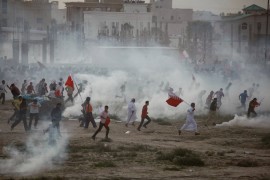Depoliticizing Bahrain’s Uprising: The Rhetoric of Human Rights
Jan 20 2013by Abbas Busafwan
Various local, regional, and international parties concerned with Bahraini affairs have failed to translate the November 2011 report of the Bahrain Independent Commission of Inquiry (BICI, also known as the Bassiouni report) into a political program similar to Yemen’s GCC Initiative. The United States and the Gulf Cooperation Council states had devised the Initiative in 2011 to quell the Yemeni uprising. Although the Gulf Initiative distorted and marginalized the results of the revolution in Yemen, some argue that it also saved the country from turning into another bloodbath scenario like that in Syria. Nothing of the sort has happened in Bahrain, where the stakes simply are not as high for these same powers that have since condoned the violence that the Bahraini regime has meted out against the peaceful protesters. While the results of the BICI report were far from shocking for most Bahrainis, that the Bahraini regime-initiated inquiry actually documented horrific human rights violations in the small Gulf country raised expectations of implementing accountability measures and political reform.
The BICI report established that Bahrain is facing huge and real challenges. Its findings revealed that gross human rights violations were systematic and based on a particular training pattern received by those responsible for the implementation of the law. The report also found that senior members of the Bahraini regime had ordered these transgressions. Essentially, the inquiry disclosed that the violations were carried out:
- With similar methods at different interrogation centers. Torture—at times leading to fatalities—arbitrary arrests, beatings, verbal abuse, and looting of property were common practices;
- During a lengthy time period spanning February to June 2011; and,
- Against a wide range of targets, as it affected thousands of people and most of the areas inhabited by the opposition and the Shia majority. The violations also included arbitrary dismissal of workers, the demolition of mosques, and incitement and spread of terror by the local official media.
All this confirmed that Bahrain was facing unusual challenges. Yet for the last thirteen months, the debate has remained centered on determining “the nature” of these challenges as opposed to actively addressing the source of the problem: the complex political system itself. Framing the violations of the last two years solely within a human rights lens de-politicizes the concerted anti-revolution strategies of the regime and its allies while reinforcing the view that reform and dialogue are the way forward. The regime can thus easily address the human rights perspective through adequate police training, improving the conditions of detention, and punishing discrimination against Shia citizens. Tackling the “political crisis” in Bahrain, however, would require a complete restructuring of the entire ruling infrastructure based on ideals of the 14 February Revolution, namely: equality, social justice, and democratic political participation, all of which the regime has and will continue to fight tooth and nail.
These institutional transformations necessarily extend to the furthest reaches of the executive bodies in the state. Indeed, for the full implementation of the Bassiouni recommendations, this restructuring must include:
- Nationalizing the security apparatus by eliminating its dependency on foreign mercenaries and opening it up to all Bahraini nationals regardless of sect, gender, political affiliation, etc. and in the process forging a more unitary notion of citizenship;
- Reforming the intelligence bodies and implementing safeguards to guarantee their operation within the provisions of the Constitution;
- Developing an impartial and functional judiciary system;
- Eliminating the control of the royal family over the national media; and,
- Most importantly, working to remove the army from politics and reorient its mission toward the defense of the country and not the rule of the Khalifa family.
This restructuring would directly undermine the very pillars upon which the power and legitimacy of the Bahraini authoritarian state rests. It is unlikely, therefore, that the Khalifa regime will countenance a true institutional reform program, given that it would essentially cause the loss of every tool the regime has used to suppress and curb the opposition’s aspirations of a governing partnership.
The Yemeni GCC Initiative did not merely propose surface changes promoting limited protections of human right, but set forth a program for the institutional reform of the army, the police, the judiciary, and other state bodies. However, the process of political restructuring put in place by the GCC Initiative was limited by two significant constraints imposed by national and international geopolitical configurations. First, it maintained regional (and by extension, international) power arrangements, with Sana’a continuing to work within the framework of the Saudi-dominated system. Second, those social and political institutions of support for the former Saleh regime retained considerable influence in the newly emerging political structure. Thus, the GCC Initiative makes certain concessions to the revolution, imposing limited reform, but sustains much of the structural arrangements of power through which the former regime operated.
With the Bahraini case, it is obvious that the ruling authority is working systematically with its regional and international allies to establish an even more limited debate over the Bahraini uprising. In doing so, they are ignoring the core problem of the Bahraini political crisis: the political infrastructure of the Khalifa ruling family.
Britain has taken the lead in adopting a strategy of “dwarfing” these structural problems by framing them as human rights “concerns,” as remarks by the Foreign Office Minister for the Middle East Alistair Burt indicate. Charging Michael Posner, the Assistant Secretary of State for Democracy, Human Rights, and Labor, with the responsibility of overseeing the Bahraini case signifies that the United States is pursuing this path, too. It is naive to think that this strategy reflects a lack of recognition of the real problem. Rather, it exposes the hypocrisy of their approach. US, British, and other government officials make public expressions of concern for human rights abuses, while the pillars of excessive power that maintain the authoritarian rule of the Khalifa family are upheld through Saudi and Anglo-American support.
The issuing of the Bahraini Independent Commission of Inquiry (BICI) report gave some initial hope of reinforcing a program of national reconciliation and democratization. However, what has happened has been quite the opposite. The regime has continued its repressive and violent practices to preserve its authoritarian rule and it has made any progress towards stability and prosperity even less likely. If any real change for the good of the country as a whole is to happen, we must insist on substantive structural transformations within the institutions of power, rather than limited demands for human rights protections.
http://www.jadaliyya.com/pages/index/9666/depoliticizing-bahrains-uprising_the-rhetoric-of-h




